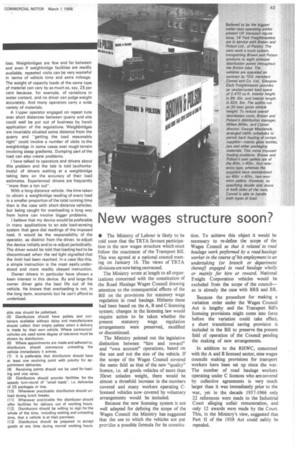New wages structure soon?
Page 45

If you've noticed an error in this article please click here to report it so we can fix it.
• The Ministry of Labour is likely to be told soon that the TRTA favours participation in the new wages structure which must follow the enactment of the Transport Bill. This was agreed at a national council meeting on January 16. The views of TATA divisions are now being canvassed.
The Ministry wrote at length to all organizations concerned with the constitution of the Road Haulage Wages Council drawing attention to the consequential effects of the Bill on the provisions for statutory wage regulation in road haulage. Hitherto these had been based on the A, B and C licensing system; changes in the licensing law would require action to be taken whether the present statutory wage regulation arrangements were preserved, modified or discontinued.
The Ministry pointed out the legislative distinction between "hire and reward" and "own account" operations, based on the use and not the size of the vehicle. If the scope of the Wages Council covered the same field as that of the new "quality" licence, i.e. all goods vehicles of more than 3Ocwt unladen weight, there would be almost a threefold increase in the numbers covered and many workers operating Clicensed vehicles now covered by voluntary arrangements would be included.
Because the new licensing system is not well adapted for defining the scope of the Wages Council the Ministry has suggested that the use to which the vehicles are put provides a possible formula for its constitu
tion. To achieve this object it would be necessary to re-define the scope of the Wages Council so that it related to road haulage work performed by a road haulage worker in the course of his employment in an undertaking (or branch or department thereof) engaged in road haulage wholly or mainly for hire or reward. National Freight Corporation vehicles would be excluded from the scope of the council— as is already the case with BRS and BR.
Because the procedure for making a variation order under the Wages Council Act is lengthy and the Transport Bill's licensing provisions might come into force before the variation could take effect, a short transitional saving provision is included in the Bill to preserve the present field of operation of the Council pending the making of new arrangements.
In addition to the RHWC, concerned with the A and B licensed sector, nine wages councils making provisions for transport workers have been set up since the war. The number of road haulage workers operating under C licences who are covered by collective agreements is very much larger than it was immediately prior to the war, yet in the decade 1957-1966 only 22 references were made to the Industrial Court alleging unfair remuneration, and only 12 awards were made by the Court. This, in the Ministry's view, suggested that Part II of the 1938 Act could safely be repealed.








































































































































































